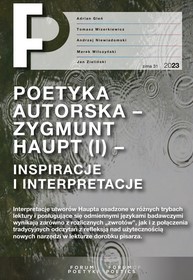Elementary memory and its limits. Element and detail in Zygmunt Haupt’s prose
Elementary memory and its limits. Element and detail in Zygmunt Haupt’s prose
Author(s): Christian ZehnderContributor(s): Paulina Zagórska (Translator)
Subject(s): Comparative Study of Literature, Polish Literature, Theory of Literature
Published by: Uniwersytet im. Adama Mickiewicza w Poznaniu
Keywords: Galicia; Central Europe; geopoetics; emigration; Zygmunt Haupt; Czesław Miłosz; Eastern borderlands;
Summary/Abstract: Recapitulating major tendencies in Haupt studies, the paper revisits the question of memory models in works by Zygmunt Haupt, and proposes to extend the established, “epiphanic” reading of Haupt’s prose with a geopoetic perspective. Based on numerous examples from Haupt’s works, the paper demonstrates how exuberant details of the lost Galician world tend to grow on the ground of an element seemingly remembered as monolithic and absolute (rain, snow, sand, grass, air, dust, etc.). A certain type of epiphany crystallizes in the emergence of details, focused on surroundings rather than on the subject. Thanks to this externalization of memory through the elements, details gain their specific non-necessary status expressed in the typical Hauptian enumerations. This model is limited by “Polish culturalism” (Andrzej Mencwel), according to which nature constitutes first and foremost “a nonhuman world” – an idea that Haupt seems to share in a moderate, apolitical form. Haupt’s culturalist attitude is further explored by a comparison of some of his American stories with negative descriptions of Californian landscape by Czesław Miłosz and Theodor W. Adorno.
Journal: Forum Poetyki
- Issue Year: 2023
- Issue No: 31
- Page Range: 80-97
- Page Count: 18
- Language: English

